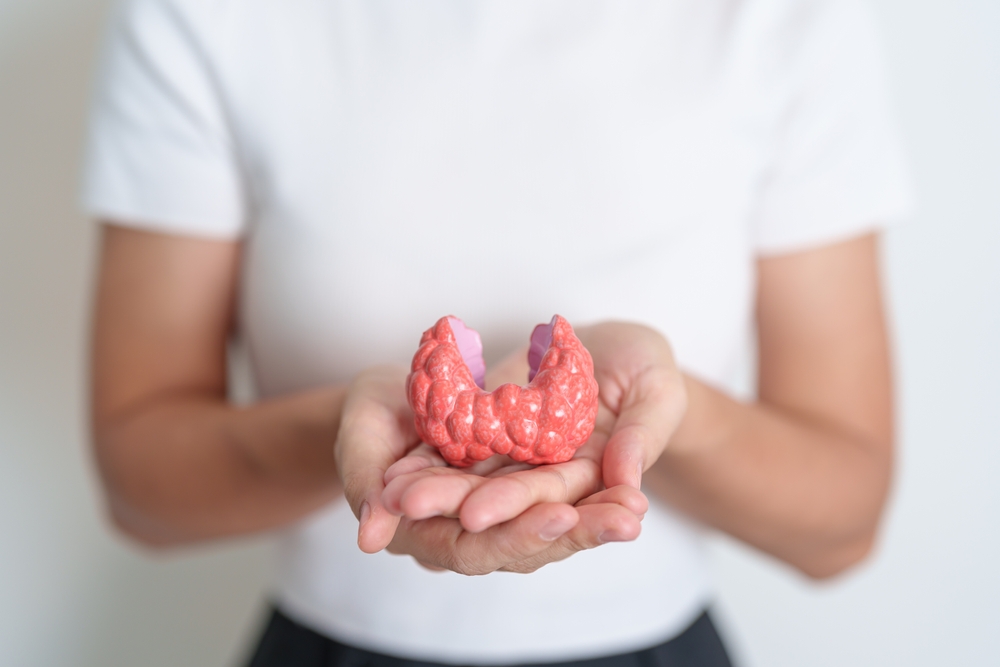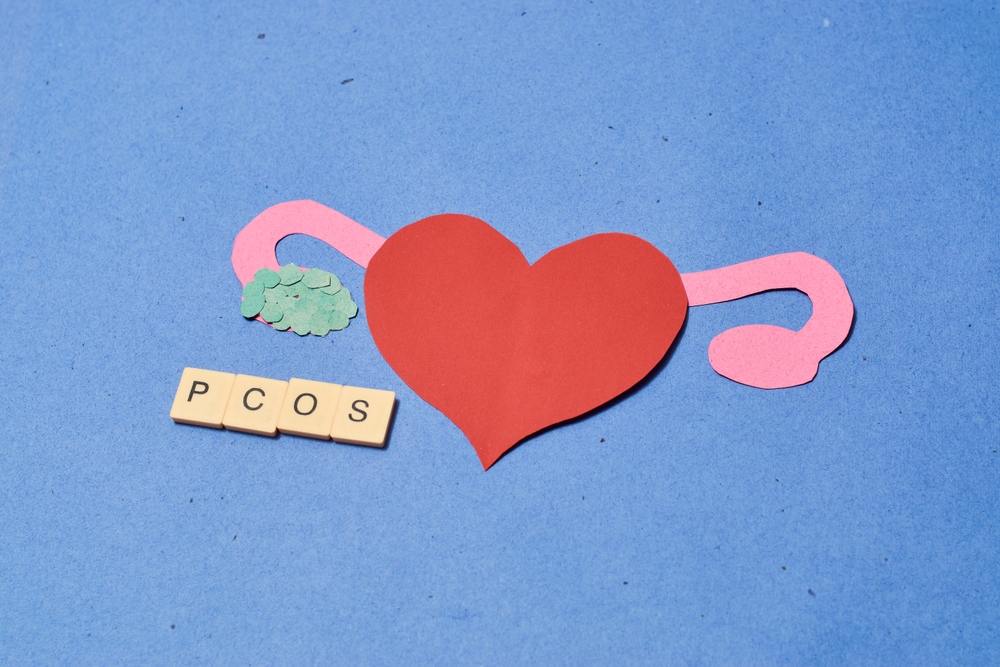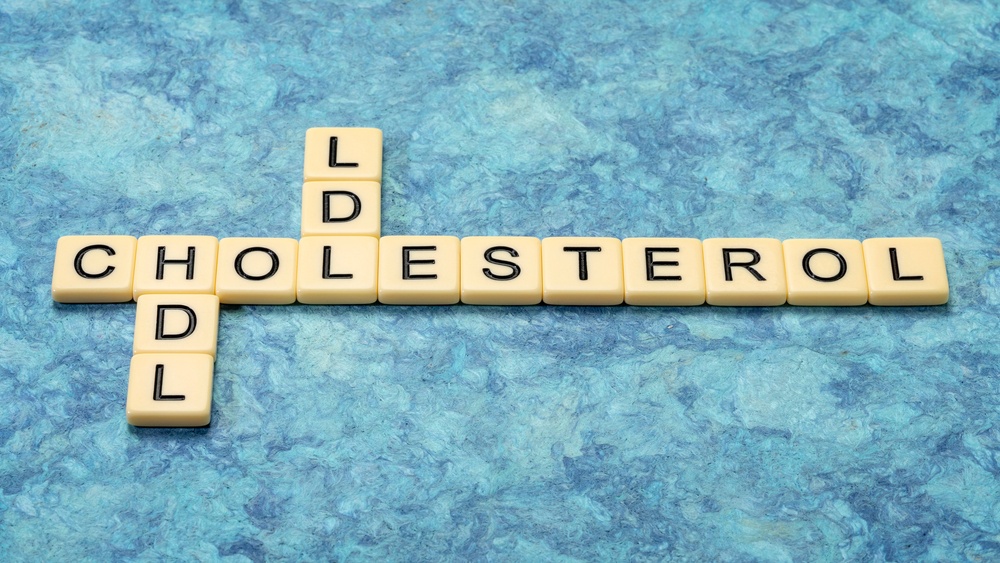Quick Summary
- The thyroid gland regulates metabolism, so any imbalance in thyroid hormone levels can impact body weight, energy levels, and digestion.
- Hypothyroidism often causes weight gain, especially in women, due to slowed metabolism and hormone shifts.
- Thyroid medications, such as levothyroxine, help normalize hormone levels but typically result in only modest weight loss.
- Taking thyroid medication properly, on an empty stomach, and under a doctor's guidance is key to effectiveness.
- Too much thyroid hormone can be harmful, causing side effects like chest pain, racing heartbeat, or muscle weakness.
The thyroid is a small gland in the neck that controls the body's energy utilization. It does this by producing thyroid hormones, which regulate heart rate, body temperature, and body weight.
When the thyroid is not working properly, it can either slow down or speed up the body's processes. Many women first notice weight changes when they have thyroid problems, which often force them to seek medical advice.
Due to this, some people believe that thyroid medications can aid in weight loss. These medications are meant to bring thyroid hormone levels back to normal, not directly help with weight loss.
This blog will address the question: Does thyroid medication cause weight loss, and can the medications used to treat these conditions help with weight loss in women?

Thyroid Gland And Its Functions
The thyroid gland regulates various body functions. It produces two types of thyroid hormones: T3 and T4. These hormones manage energy, temperature, heart rate, and metabolic rate. They also support healthy growth and brain function.
The thyroid does not act alone. The pituitary gland, located in the brain, controls it. This gland releases a chemical called thyroid-stimulating hormone, or TSH. When the body needs more thyroid hormone, the pituitary makes more TSH. This tells the thyroid to increase hormone production. If the hormone level is too high, the pituitary lowers TSH to reduce it.
This system keeps thyroid hormone levels in balance. When this balance is disrupted, one can experience various symptoms, such as weight loss, sweating, or feeling anxious. If the thyroid produces too little hormone, the body slows down, and one begins to feel tired, cold, or gain weight.
Because the thyroid regulates the body's metabolism, even slight changes can significantly impact how the body utilizes energy. Metabolism is the process by which food is converted into energy. If thyroid hormone is low, the body burns energy more slowly. If it is high, energy burns too quickly.
Common Thyroid Disorders That Affect Weight
Thyroid problems are common and can change the way the body handles weight. The two most frequent issues are hypothyroidism and hyperthyroidism. These conditions affect thyroid hormone levels but in different ways.
Hypothyroidism, also known as an underactive thyroid, refers to a condition in which the thyroid does not produce sufficient hormones. When this happens, the body slows down and forces your metabolism to slow down, resulting in the body burning fewer calories. People with hypothyroidism notice weight gain, even if they do not eat more than usual. They may also experience fatigue, coldness, dry skin, and a low mood.
For some, an underactive thyroid makes it hard to lose weight. Even with a balanced diet and regular exercise, the body may still retain excess weight. This is not always due to fat gain. Sometimes, it is due to water retention or slower digestion, which can cause the body to feel heavier and bloated.
Hyperthyroidism is the opposite. It happens when the thyroid gland produces excessive hormones. This condition is called an overactive thyroid. It causes the body to speed up. People may feel anxious, experience hot flashes, or have a rapid heartbeat. They often lose weight, even if they eat more than usual. This is because the body is burning energy too quickly.
However, the weight loss linked to an overactive thyroid is not always healthy and can cause muscle loss and low strength. Some people may feel tired even if they appear to have more energy.
Both hypothyroidism and hyperthyroidism affect the way the body uses energy. These changes in thyroid hormone levels often result in noticeable changes in weight. In many cases, these changes are the first sign that something may be wrong.
The Connection Between Hypothyroidism And Weight Changes In Women
Hypothyroidism is more common in women than in men. This is mostly due to the higher risk of autoimmune thyroid disorders in women, especially during times of hormonal change such as pregnancy or menopause. When the thyroid does not make enough hormones, it slows down many body functions, including how the body uses energy.
As thyroid hormone levels drop, the body's metabolism slows. This makes it easier to gain weight, even without changes in eating habits. An underactive thyroid can also cause the body to hold on to water, making it harder to lose weight. For many women, weight gain is one of the first signs of a thyroid problem.
Other symptoms of hypothyroidism include dry skin, tiredness, constipation, and irregular menstrual periods. These changes occur because the body is not receiving the necessary hormones to function normally. Since these signs often appear gradually, they may be missed initially.
A study examined the impact of thyroid treatment on weight. It followed patients with hypothyroidism before and after treatment. The study found that after hormone levels returned to normal, patients experienced weight loss.
On average, weight went from 70.9 kg to 68.7 kg. However, most people remained in the overweight range, even after treatment. [1] Another study examined the impact of obesity on thyroid hormone levels and cholesterol. The study included 200 adults, with half in the obese group and half in the non-obese group.
Individuals in the obese group exhibited higher thyroid-stimulating hormone (TSH) levels, as well as changes in T3 and T4 levels. These changes suggest that many had signs of an underactive thyroid. The same group also showed higher cholesterol levels, more LDL, higher triglycerides, and lower HDL levels compared to those who were not obese.
More women were found in the obese group, which supports the idea that hypothyroidism and weight problems are more common in women. [2] This means that treating hypothyroidism can help reduce weight slightly, but it may not lead to full weight loss on its own. For better results, changes in diet and activity are often needed as well.
Can Thyroid Medication Help Women Lose Weight?
Many women with hypothyroidism ask whether thyroid medication can help with weight loss. This is a valid concern, especially when weight gain is one of the first signs that something is off. Although medication can help stabilize thyroid hormone levels, it is not specifically intended for weight management.
The most commonly used to treat hypothyroidism is levothyroxine. It is a synthetic version of the T4 thyroid hormone that restores what the body lacks. Once thyroid hormone levels return to normal, the body's metabolism begins to improve. This can lead to modest weight loss, mostly due to reduced water retention and improved digestion. However, it does not usually lead to major fat loss on its own.
Taking levothyroxine when it's needed can help the body function more efficiently, but taking too much thyroid hormone can be harmful. It may cause a fast heartbeat, sleep problems, and an increased risk of heart disease. This is why medication should only be taken under a doctor's advice.
Some people search for the best thyroid medication for weight loss, but the right treatment depends on medical needs, not just weight goals. There is no one-size-fits-all solution. The best approach is to correct low hormone levels and support thyroid function naturally when possible. In addition to prescription medication, some people choose to support their thyroid with targeted supplements.
Fem Excel's Thyroid Capsule is one such option. It is not a replacement for medical treatment, but it can help support healthy thyroid function. This supplement contains nutrients that may help the body produce and utilize thyroid hormones more effectively.
It can be a helpful part of a broader wellness plan, especially for women managing mild imbalances or recovering from low energy.
Why You Might Not Lose Weight Even With Thyroid Treatment
Some people expect thyroid medication to help them lose weight quickly, but that is not always the case. Even after treating hypothyroidism, weight may stay the same or only drop slightly due to several other factors that can affect how the body responds to treatment.
Other medications can be a reason why weight loss may not occur. Certain medications, like steroids or antidepressants, can lead to weight gain. These medications may slow the body's response to thyroid medication, even when thyroid levels are within the normal range.
Problems with the liver or adrenal glands can also affect results. The liver breaks down hormones, while the adrenal glands support energy and stress responses. If either organ is not working properly, metabolism may remain slow despite good TSH levels.
Diet is another important factor. A low dietary fiber intake can slow digestion and increase hunger. A diet lacking whole foods and fiber can limit weight changes, even with medication.
In some cases, an autoimmune disease like Hashimoto's may also make weight loss harder. These conditions often involve inflammation, fatigue, and other symptoms that affect activity levels and appetite.
Regular blood tests can track both TSH levels and thyroid hormone levels to ensure treatment is on the right path. However, lab results alone do not always reflect how someone feels or how their body responds.
Best Practices When Taking Thyroid Medications For Weight-Related Goals
Taking thyroid medication the right way can make a big difference in how well it works, especially for those trying to manage weight gain. The way you take the medicine affects how it is absorbed and how your body uses it.
You should take thyroid medication, such as levothyroxine, on an empty stomach, usually first thing in the morning. Food, coffee, and certain supplements can interact with how the body absorbs medication. Wait at least 30 to 60 minutes before eating, which helps your body absorb the full dose.
It is also important to avoid grapefruit juice around the time you take your medication. Grapefruit can alter how the body metabolizes certain medications, including those used to treat thyroid conditions. This may lower its effectiveness and slow your progress toward better hormone balance and possible weight loss.
Your doctor may start with a low dose and adjust it based on how your body responds. This usually takes a few weeks to begin showing results. However, finding the right dose can take several weeks or even longer.

Risks And Side Effects Of Thyroid Medications
Thyroid medication plays a key role in thyroid replacement therapy, especially for those with hypothyroidism. However, like any medication, it can cause side effects if not taken properly or if the dose is too high.
When someone takes too much thyroid hormone, the body can become overactive. This may cause symptoms such as chest pain, a racing heartbeat, or irregular heartbeats. These signs should never be ignored, as they can become life-threatening if left untreated.
Other side effects may include excessive sweating, heat sensitivity, or feelings of restlessness. Some people also report muscle weakness, tremors, or trouble sleeping. Skin reactions, such as a skin rash, may occur in a small number of people.
In rare cases, individuals may need to discontinue taking levothyroxine or adjust their dose if side effects persist. Your doctor may also explore other options or monitor you more closely to prevent long-term problems.
One meta-analysis reviewed how levothyroxine affects bone health in people with hypothyroidism. It found that those with overt hypothyroidism had slightly lower bone density in the spine after treatment, especially men treated for less than five years. However, no significant changes were seen in milder cases or other parts of the body.
This indicates that while thyroid medication is effective, it may have a mild impact on bone health in some individuals. [2] It is important to remember that thyroid medication is meant to restore balance, not push the body into a fast state.
When Thyroid Symptoms Worsen: What To Do Next
It is important to know when to see a healthcare professional if you are gaining weight or feeling off and suspect a thyroid disease. Many people wait too long, hoping that things will improve on their own. But getting help early often makes treatment easier and more effective.
You should tell your doctor if you experience symptoms, such as constant tiredness, slow thinking, or sudden weight gain. Also, pay attention if your symptoms start to worsen. Feeling cold all the time, losing hair, or changes in your heartbeat are also signs that should not be ignored.
In some cases, the doctor can order blood tests to check your thyroid hormone levels. These tests help confirm what is wrong and guide the development of the right treatment plan.
If you feel chest pain, have a fast heartbeat, or have trouble breathing, seek immediate treatment. These could be signs of a more serious issue.
Final Thoughts
Many women with hypothyroidism ask if thyroid medication can help with weight loss. The answer is yes, but only to a small extent. Most people lose a few pounds after treatment begins, often due to losing water weight rather than body fat.
Thyroid medication helps restore normal thyroid hormone levels. This can improve energy and metabolism. However, it does not result in significant or rapid changes in body weight. One must eat well, stay active, and get enough sleep to maintain long-term weight control.
Good health is not just about the number on the scale. Managing hypothyroidism helps your body function better. Over time, this may help achieve better weight balance, but it should not be the sole goal.
Support from trusted sources, such as can make a difference. Fem Excel provides helpful tools, resources, and support for women managing thyroid and hormone-related health. It promotes informed choices and long-term care, not quick fixes.
References
1. RÃos-Prego, M., Anibarro, L., & Sánchez-Sobrino, P. (2019). Relationship between thyroid dysfunction and body weight: a not so evident paradigm. International journal of general medicine, 12, 299-304. https://doi.org/10.2147/IJGM.S206983
2. Rizwan, R., Zafar, A., Bashir, S., Abideen, Z., Ejaz, M., Zahid, N., & Haque, M. U. (2024). Thyroid and Lipid Profile Dysfunction among Obese versus Non-Obese Individuals Study Design. Pakistan Journal of Health Sciences, 115-120. https://doi.org/10.54393/pjhs.v5i03.1412
3. Li, X., Zhang, T., Zhang, H. et al. Effects of levothyroxine therapy on bone and mineral metabolism in hypothyroidism: a systematic review and meta-analysis. BMC Endocr Disord 25, 11 (2025). https://doi.org/10.1186/s12902-024-01819-7






